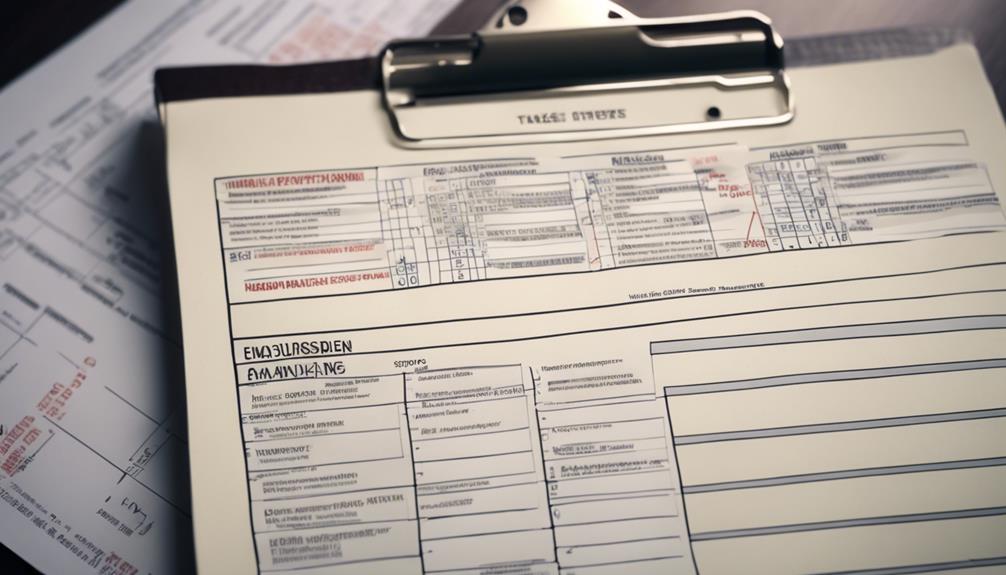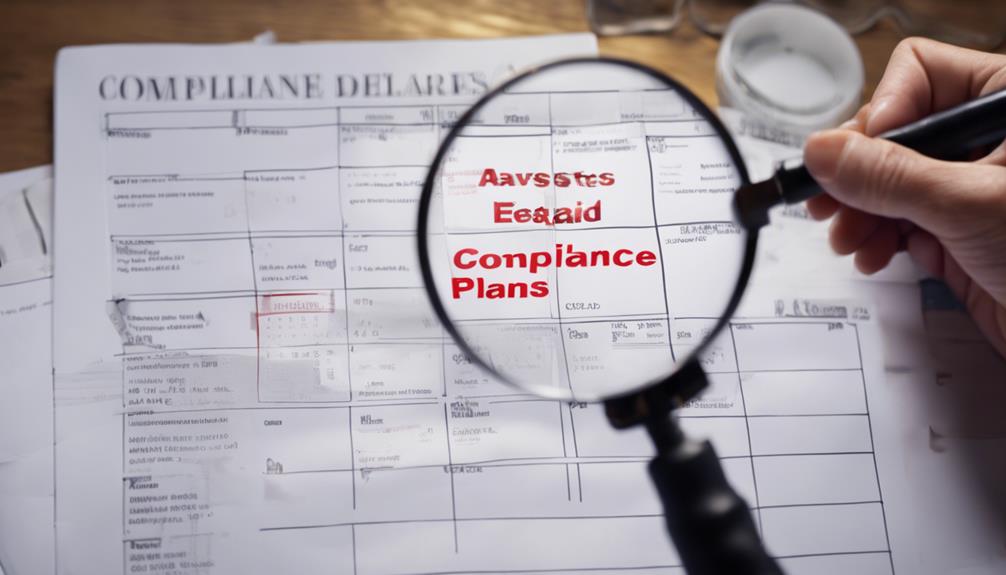Imagine navigating through a dense forest, each tree representing a different business regulation that you must maneuver around. Now, picture having a map with ten clear pathways to guide you through this regulatory jungle.
These tips will not only help you navigate the intricate landscape of US business regulations but also empower you to thrive within it. By implementing these strategies, you can successfully navigate the intricate web of regulations that govern the business landscape.
Key Takeaways
- Identify key regulations and create a compliance checklist for thorough oversight.
- Stay updated on regulation changes to ensure ongoing compliance and avoid penalties.
- Utilize regulatory compliance software for efficient tracking and management.
- Attend regulatory workshops for practical advice and networking opportunities in navigating business regulations.
Identify Key Regulatory Agencies
To successfully navigate US business regulations, you must first grasp the crucial task of identifying key regulatory agencies. These regulatory bodies, such as the Securities and Exchange Commission (SEC), Environmental Protection Agency (EPA), Occupational Safety and Health Administration (OSHA), Food and Drug Administration (FDA), and Federal Trade Commission (FTC), play vital roles in overseeing various aspects of compliance within specific industries.
Understanding the focus areas of each regulatory agency is essential for ensuring that your business operates within the bounds of the law. The SEC monitors financial markets, the EPA focuses on environmental protection, OSHA ensures workplace safety, the FDA regulates food and drug safety, and the FTC oversees consumer protection.
Understand Permitting Processes

To successfully navigate US business regulations, you must grasp the intricacies of permit application requirements and regulatory compliance guidelines. Understanding these processes is essential for ensuring that your business operates within the bounds of the law.
Permit Application Requirements
Navigating the complex landscape of US business regulations requires a thorough understanding of permit application requirements to ensure legal compliance and smooth operations for your business. When applying for permits, keep in mind the following key points:
- Different businesses require specific permits, like health department permits for food and alcohol establishments.
- Understanding local zoning laws is crucial to comply with property use regulations.
- Secure permits for specific activities, locations, and industries to operate legally.
- Compliance with regulations for sales tax, environmental concerns, and land use is essential during the permit application process.
Regulatory Compliance Guidelines
For a smooth and compliant business operation, understanding the permitting processes is essential. To ensure regulatory compliance, businesses must adhere to specific licensing requirements at the city, state, and federal levels. It is crucial to obtain permits tailored to your business type and impact, ensuring alignment with industry-specific regulations. Compliance experts recommend checking the Small Business Administration website for detailed information on licensing requirements tailored to your industry. Businesses operating in sectors such as food and alcohol must secure health department permits for legal operation. Additionally, businesses should prioritize compliance with regulations concerning sales tax, environmental standards, and land use permits to avoid legal complications.
| Regulatory Requirements | Compliance Experts |
|---|---|
| Obtain necessary licenses | Check SBA website for details |
| Secure business permits | Align with industry regulations |
| Acquire health department permits | Prioritize compliance |
| Comply with sales tax regulations | Avoid legal complications |
| Ensure environmental standards | Seek guidance when needed |
Research Industry-Specific Regulations

When navigating US business regulations, researching industry-specific regulations is pivotal. Identify key regulations that apply to your industry, understand the compliance requirements, and seek legal guidance if needed.
This proactive approach can help you stay ahead of regulatory changes and avoid costly penalties.
Identify Key Regulations
To ensure full compliance with regulations pertinent to your industry, conduct thorough research to identify the key requirements that impact your business operations. It's crucial to stay informed about the specific regulations that govern your industry.
Here are some essential steps to help you navigate through the regulatory landscape effectively:
- Research industry-specific regulations diligently.
- Identify federal, state, and local regulations applicable to your business.
- Stay updated with industry associations and regulatory bodies.
- Utilize online resources and databases for detailed regulatory information.
Understand Compliance Requirements
Navigating US business regulations successfully requires a deep understanding of industry-specific compliance requirements to ensure your operations align with legal standards and remain in good standing. Keeping up with regulatory changes is crucial for staying compliant. Research industry-specific regulations to identify key requirements impacting your business. Stay informed about updates that may affect your operations. Consulting legal experts or industry associations can provide valuable insights into compliance needs. Implement internal processes to track and adhere to these regulations continuously. Check out the table below for a clearer overview:
| Industry Specific Regulations | Compliance Requirements |
|---|---|
| Healthcare | HIPAA, OSHA |
| Finance | SEC, FINRA |
| Food and Beverage | FDA, USDA |
| Technology | GDPR, FCC |
| Construction | OSHA, EPA |
Seek Legal Guidance
For a comprehensive understanding of industry-specific regulations impacting your business, seeking legal guidance tailored to your sector is essential. Industry-specific regulations vary greatly, necessitating specialized legal advice. Here are some best practices for navigating industry-specific regulations:
- Legal counsel can provide insights on specific compliance requirements.
- Understanding these regulations helps in avoiding costly penalties.
- Researching and staying informed about industry-specific regulations is crucial.
- Industry-specific legal guidance aids in effectively navigating complex regulatory landscapes.
Hire a Local Compliance Consultant

Considering the complex landscape of US business regulations, enlisting the expertise of a local compliance consultant can be a strategic decision to ensure your business meets all necessary requirements.
Local compliance consultants possess in-depth knowledge of specific state and city regulations, making them invaluable resources for navigating the intricate web of compliance obligations.
By hiring a local compliance consultant, you can benefit from their tailored guidance, which is based on the unique business environment of your specific location. These consultants are well-versed in handling complex licensing and permitting requirements, offering insights on zoning laws, insurance needs, and other local regulations that may impact your business operations.
Their expertise can streamline the process of ensuring regulatory compliance, saving you time and effort while mitigating the risks of non-compliance.
Embracing the support of a local compliance consultant is a proactive step towards establishing a solid foundation for your business within the regulatory framework.
Establish a Compliance Checklist

Establishing a compliance checklist is crucial for your business to stay on top of key regulations. By prioritizing important items like licensing requirements and cybersecurity protocols, you can ensure your operations meet legal standards.
Regular updates to your checklist will help you adapt to changing regulations and avoid potential penalties.
Prioritize Key Regulations
To effectively prioritize key regulations in your industry, begin by crafting a comprehensive compliance checklist that outlines essential requirements for your business. This checklist will serve as your roadmap to navigating the regulatory environment effectively.
When establishing your compliance checklist, consider the following:
- Identify key regulations such as Labor Standards that directly impact your industry.
- Create a compliance checklist to ensure all requirements are met.
- Prioritize regulations with strict penalties for non-compliance to avoid legal issues and financial repercussions.
- Stay informed about any updates or changes to regulations to maintain compliance.
Update Checklist Regularly
Regularly updating your compliance checklist is crucial for ensuring your business stays aligned with current laws and regulations. By incorporating the latest regulatory developments into your checklist, you create a solid foundation for compliance.
This proactive approach helps track and monitor regulatory requirements, preventing potential legal issues and penalties. An updated compliance checklist serves as a roadmap for adhering to industry standards, ensuring ongoing compliance with ease.
Make it a priority to review and adjust your checklist regularly to stay ahead of any regulatory changes that may impact your business operations. Embracing this practice as one of your best tips for navigating US business regulations will ultimately contribute to your business's success and longevity.
Implement Ongoing Compliance Training

Embrace ongoing compliance training as a cornerstone for maintaining regulatory adherence and fostering a culture of awareness within your organization. Small business owners must recognize the importance of staying abreast of the regulations that affect their industry. By implementing regular training programs, you can ensure that your staff are well-informed about the latest regulatory changes and requirements.
Here are some key reasons why ongoing compliance training is essential:
- Stay Updated: Ongoing training ensures that your employees stay up to date on any regulatory changes that may impact your business.
- Role Clarity: Training sessions help your team understand their role in maintaining compliance within the organization.
- Industry Specific: Training programs can cover industry-specific regulations, providing tailored guidance for your business.
- Cultural Awareness: Fostering a culture of awareness and responsibility towards regulatory compliance is crucial for overall organizational success.
Utilize Regulatory Compliance Software

Consider incorporating regulatory compliance software into your business operations to streamline tracking and management of various regulations.
Compliance software automates these processes, making your compliance efforts more efficient and reducing the likelihood of human error. By integrating compliance software, you can enhance your efficiency and accuracy in meeting regulatory requirements.
These software solutions also enable quick adaptation to regulatory changes, ensuring that your business stays up to date with evolving laws. Moreover, utilizing compliance software helps minimize the resources needed for staying compliant, saving you time and effort in the long run.
With regulatory changes being a constant in the business world, having compliance software in place can provide your business with a competitive edge by ensuring that you're always in adherence to the latest regulations. Make the smart choice and invest in compliance software to simplify your regulatory compliance processes.
Attend Regulatory Workshops and Seminars

To deepen your understanding of regulatory compliance and stay ahead of evolving laws, engaging with regulatory workshops and seminars is a crucial step for your business success. These events offer in-depth insights on compliance requirements and updates, helping small businesses stay informed about changing regulations.
Here are some key benefits of attending regulatory workshops and seminars:
- Gain practical advice: Workshops provide practical advice on navigating complex legal matters and staying compliant.
- Stay informed: These events offer the latest information on regulatory changes, ensuring you're up to date with the requirements.
- Enhance adaptability: Learning from regulatory workshops can enhance a small business's ability to adapt and thrive in a regulated environment.
- Network with experts: Seminars provide networking opportunities with regulatory experts and peers in the industry, allowing you to build valuable connections.
Network With Regulatory Experts

Engage with regulatory experts to gain valuable insights and guidance on navigating compliance requirements effectively. Small businesses can greatly benefit from networking with regulatory experts to stay informed about changing laws and policies. Regulatory experts offer specialized knowledge that can help you develop proactive compliance strategies tailored to your business needs. By collaborating with these experts, you can navigate the complex legal frameworks and regulations with confidence. Establishing relationships with regulatory experts is essential for small businesses looking to adapt efficiently to regulatory changes.
| Benefits of Networking with Regulatory Experts | |
|---|---|
| Gain valuable insights into compliance requirements | Stay informed about changing laws and policies |
| Receive guidance on navigating complex legal frameworks | Develop proactive compliance strategies |
Networking with regulatory experts is a strategic move for small businesses aiming to enhance their compliance strategies. By tapping into the expertise of regulatory professionals, you can proactively address regulatory challenges and ensure your business operates within the bounds of the law.
Regularly Review and Update Compliance Plans

To ensure your small business remains compliant with ever-evolving laws and regulations, routinely reviewing and updating your compliance plans is crucial. Staying updated is essential to mitigate risks and maintain a good standing with regulatory bodies.
Here are key steps to effectively manage your compliance plans:
- Regular Reviews: Conduct frequent assessments of your compliance plans to ensure they align with current laws and regulations.
- Timely Updates: Stay informed about any new legislation or regulatory changes that may impact your business and promptly update your compliance plans accordingly.
- Proactive Scheduling: Implement a regular schedule for compliance plan reviews to stay ahead of potential issues and avoid penalties.
- Legal Counsel Engagement: Seek assistance from legal professionals to interpret new regulations and effectively incorporate them into your compliance plans.
Conclusion
In conclusion, by following these tips for navigating US business regulations, you can confidently conquer compliance challenges.
Remember to regularly review and update your compliance plans to stay ahead of the ever-changing regulatory landscape.
Stay informed, stay proactive, and stay compliant to succeed in the business world.
Embrace the power of preparation and precision to pave your path to prosperity.